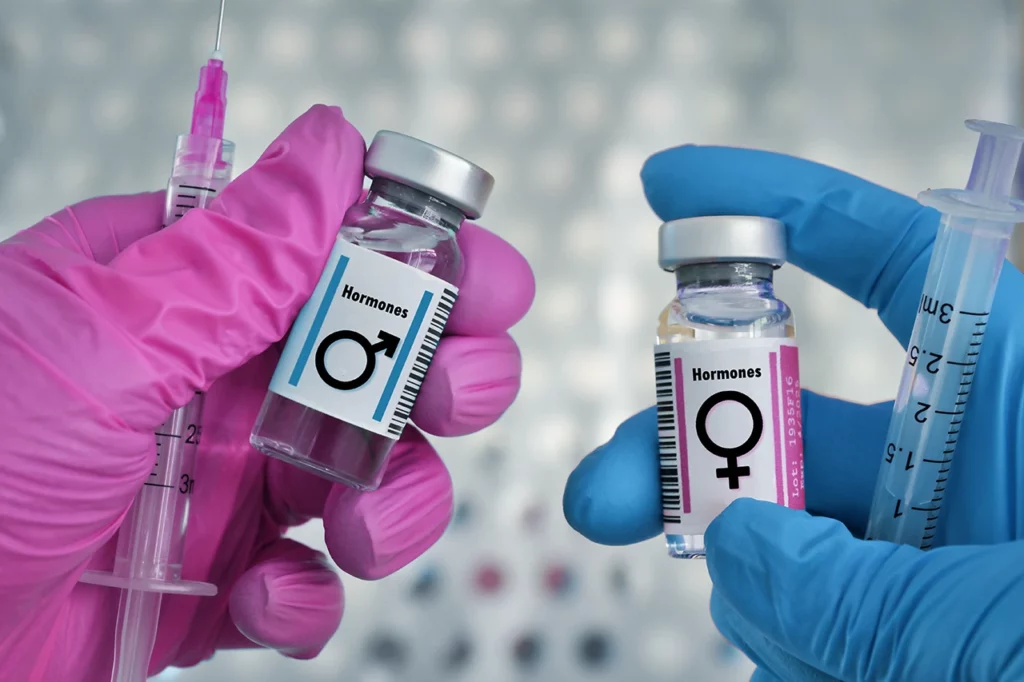To understand what hormones are, it’s important to know what the endocrine system is and how it works in both men and women.
Broadly speaking, hormones are substances that play a crucial role in regulating numerous bodily functions, ranging from growth to reproduction.
Endocrine System
The endocrine system, overseen by an endocrinologist, is a group of glands and organs that produce, store, and release hormones into the bloodstream. These hormones travel through the body to reach specific organs and tissues, where they trigger specific responses. This system works together with the nervous system to maintain the body’s balance.
The main glands of the endocrine system are:
- Hypothalamus: acts as the control center of the endocrine system, regulating the activity of the pituitary gland.
- Pituitary gland: controls other endocrine glands and produces hormones such as growth hormone and oxytocin.
- Thyroid: regulates metabolism and energy through hormones such as thyroxine (T4) and triiodothyronine (T3).
- Parathyroid glands: regulate the body’s calcium levels.
- Adrenal glands: produce hormones such as cortisol and adrenaline, which help manage stress and regulate metabolism.
- Pancreas: produces insulin and glucagon, which regulate blood sugar levels.
- Gonads: the ovaries in women and the testes in men produce sex hormones.
Pineal gland: regulates sleep and wake cycles through melatonin.The endocrine system plays a vital role in hormone regulation by coordinating complex bodily functions, ensuring that organs work in harmony, and enabling the body to adapt to both internal and external demands.
Female Hormones
Female hormones, mainly produced in the ovaries, play a central role in reproductive health but also affect other systems in the body. The main female hormones are:
- Estrogen: a key hormone in the development and maintenance of female secondary sexual characteristics, such as breast growth and fat distribution. It also regulates the menstrual cycle and strengthens bones. Additionally, it supports blood vessel health and reduces the risk of heart disease.
- Progesterone: essential for maintaining pregnancy and regulating the menstrual cycle. After ovulation, it prepares the endometrium for implantation of a fertilized egg. During pregnancy, it helps maintain a suitable environment in the uterus for fetal development.
- Testosterone: although present in smaller amounts than in men, this hormone is important for libido, energy, and bone health.
During menopause, levels of both estrogen and progesterone decrease significantly, which can lead to symptoms such as hot flashes, vaginal dryness, and increased risk of osteoporosis. As menopause approaches, hormone replacement therapy may be needed.
Male Hormones
Male hormones, mainly produced in the testes, are responsible for male sexual development, fertility, and maintenance of muscle and bone mass. The main male hormones are:
- Testosterone: the predominant male sex hormone, it plays a crucial role in male development and overall health. It is responsible for facial and body hair growth, voice changes, and increased muscle mass during puberty. It also stimulates sperm production, maintains bone density and muscle growth, and affects mood, libido, and energy levels.
- Estrogen: Present in low levels, it is nonetheless an essential hormone that helps regulate bone metabolism and supports cardiovascular health.
Hormones are fundamental elements for the proper functioning of the body, performing specific functions within the organism. Understanding what hormones are, how they work, and the role they play in overall health is essential to prevent and manage various health conditions.
At the Saludora Medical Center’s Internal Medicine Department, we can provide specialized care. Contact us!
Fuentes
MedlinePlus, Stanford Medicine, MSD Manuals


